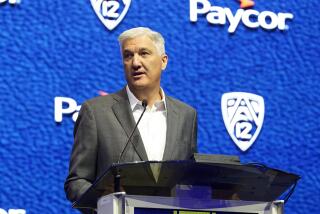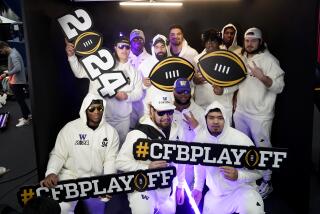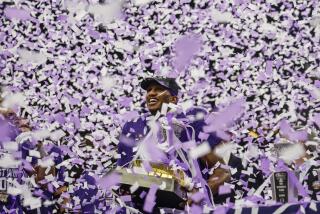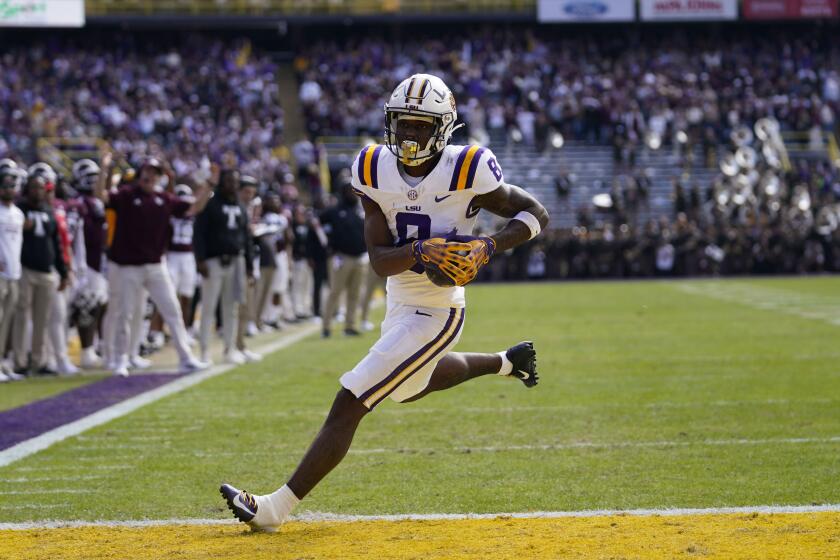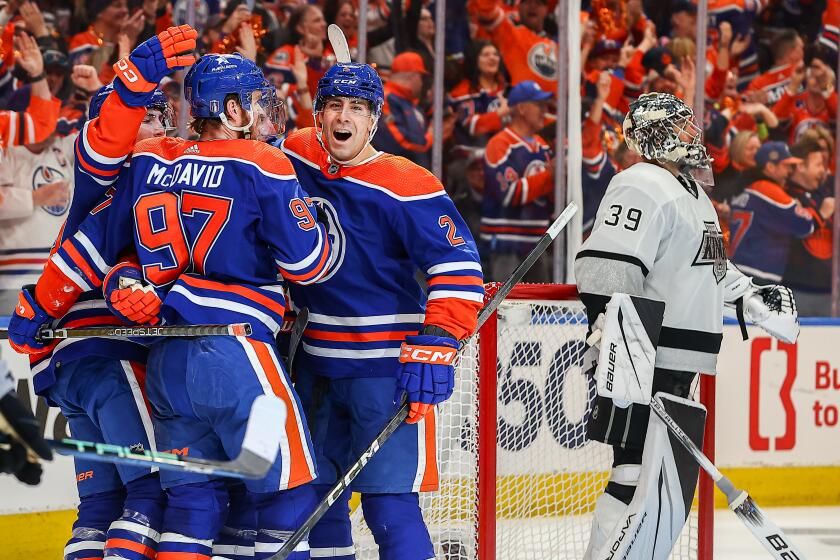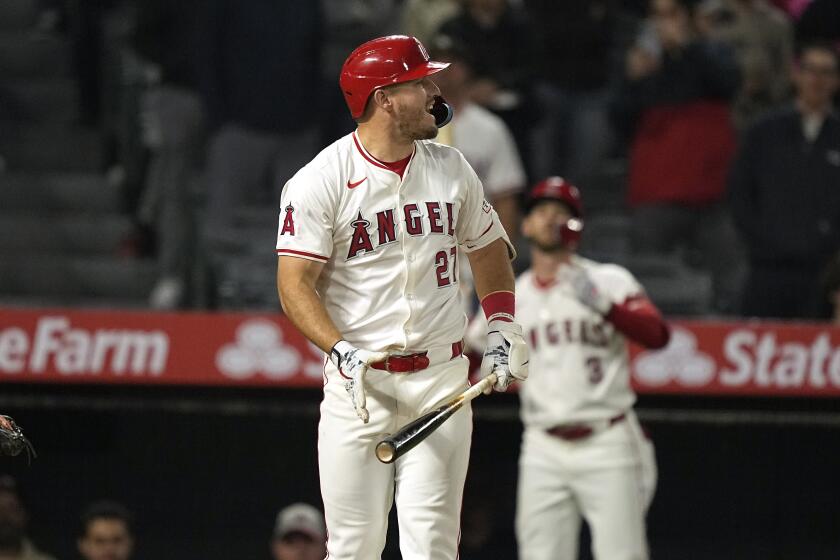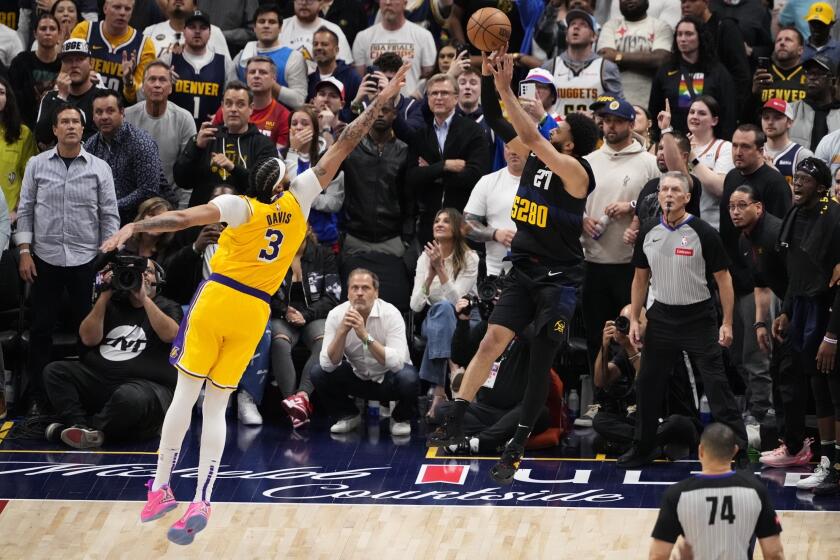Officiating situation in USC-Washington State game is latest black eye for Pac-12
The Pac-12 Conference, which has a long history of missteps when it comes to officiating football and basketball games, was left reeling Thursday from yet another embarrassment.
Commissioner Larry Scott called for an immediate change to football replays and a broader evaluation of the process in response to a controversial non-call during a game between USC and Washington State last month.
“Integrity of officiating in the conference is a top, top priority,” Scott said, adding: “So if there’s any question, any ambiguity about that, it’s something I take very, very seriously.”
The commissioner made his comments a day after Yahoo Sports, citing an internal Pac-12 document, reported that a “third party” interfered with a call during the Sept. 21 game.
It was late in the third quarter when Washington State linebacker Logan Tago drove his helmet into JT Daniels after the USC quarterback had taken a knee. The play drew a flag for roughing the passer and was immediately reviewed for targeting.
According to the document obtained by Yahoo Sports, replay officials in the stadium and at the Pac-12’s command center in San Francisco concluded there was targeting but were overridden by the “third party.”
Scott confirmed Thursday that Woodie Dixon, the conference’s general counsel and senior vice president of business affairs, had influenced the call.
A preliminary investigation by the Pac-12 suggested that Dixon — who is not an official — did not intend to be the deciding vote, but instead “believed he was trying to offer a point of view, angles on the call,” the commissioner said.
Still, Scott acknowledged, a conference executive involving himself in officiating matters might create “a perception of conflict of interest.”
The Pac-12 is no stranger to controversy when it comes to officiating.
In a 2006 game that drew national attention, Oregon recovered an on-side kick and scored to defeat Oklahoma in the final minute. Later, it appeared that field and replay officials had failed to notice a Ducks player touching the kick before it traveled the required 10 yards.
In 2013, the conference’s coordinator of basketball officials abruptly resigned after reports that he — jokingly or not — offered $5,000 or a trip to Cancun, Mexico, to any official who ejected or called a technical on Arizona coach Sean Miller.
The coordinator of officials for football, Tony Corrente, hired to revive the Pac-12’s beleaguered image, abruptly resigned from his position the following season.
More recently, the emergence of the targeting rule led to a 2016 dispute when Stanford receiver Francis Owusu was nailed, helmet to helmet, by a UCLA defensive back and left facedown on the turf. Officials did not throw a flag and the replay booth saw no reason to intercede.
“One player had the ball, another player initiated contact with his helmet,” Stanford coach David Shaw said at the time. “That should be a penalty.”
In the same game that the play between Daniels and Tago happened, USC’s Porter Gustin delivered a helmet-to-helmet hit to Washington State quarterback Gardner Minshew II late in the fourth quarter. No penalty was called and USC won the game 39-36 by blocking a field-goal attempt in the final two minutes.
Contacted about last month’s incident at the Coliseum, USC athletic director Lynn Swann declined to comment through a university representative. Daniels’ father, Steve, also declined to comment for the record when reached by the Los Angeles Times.
After practice Thursday, USC coach Clay Helton said: “The one thing that I’ve always thought in my 24 years and been very happy with, both with the NCAA and in my nine years in the Pac-12, they’ve always made the safety of the student-athlete priority No. 1, and I know that’s always going to be the case. Larry’s a good leader. He’s going to do his job and take action in whatever he needs to do.”
Helton was asked if USC turned in the non-targeting hit on JT Daniels to the Pac-12 office. “No, we did not turn that in,” he said.
Scott answered numerous questions during a Pac-12 basketball media event on Thursday, saying he was not aware of any other instances in which Dixon may have influenced a replay decision.
The conference will immediately remove Dixon and David Coleman, the director of officiating, from the in-game review process. Further changes could follow.
“I feel like this is the most significant step I can make now to acknowledge that we made a mistake … ,” Scott said. “And I feel like it’s my responsibility to make the most significant change I can make right now to lift any cloud that might exist even for the next games that we play starting Friday night.”
Times staff writer Brady McCollough contributed to this report.
Follow Ben Bolch on Twitter @latbbolch
More to Read
Get our high school sports newsletter
Prep Rally is devoted to the SoCal high school sports experience, bringing you scores, stories and a behind-the-scenes look at what makes prep sports so popular.
You may occasionally receive promotional content from the Los Angeles Times.


